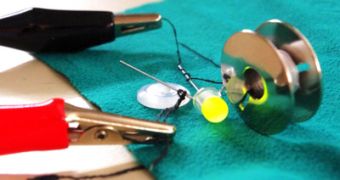This is not the first time the world hears about cotton transistors, but it is the latest update on the project that a multinational team of scientists are working on.
Some might remember that, back in October, we mentioned how some scientists had managed to use cotton in the making of transistors.
A multinational team of experts recently posted a new research paper on this very matter.
Scientists from Italy, France and the US pooled their material and mental resources and succeeded in creating cotton yarns that can be used for making the building blocks of computer circuits.
Just as important is how the flexibility is preserved, making wearable electronics, electro-clothing as it were, a genuinely possible concept.
Two kinds of transistors were created from a cotton substrate coated in various other materials.
That is to say, they didn't actually turn the cotton, known for its insulating capabilities, into a conductive material.
The researchers still think the headache of "dyeing" the threads was worth it, though.
They did, after all, succeed in producing a field-effect transistor (like the ones found in CPUs) and electrochemical transistors (similar, but capable of switching at lower voltages).
The latter, with their lower voltage requirements, are the ones that could enable wearable computers, like web-connected pants and GPS blankies.
"Nanoscale modification of natural cotton fibres with conformal coatings of gold nanoparticles, deposition of thin layers of the conductive polymer poly(3,4-ethylenedioxithiophene) (PEDOT) and a combination of these two processes were employed to increase conductivity of plain cotton yarns," says the research paper abstract.
"This innovative approach was especially designed to fabricate two classes of devices: passive devices such as resistors obtained from electrically conductive cotton yarns, and two types of active devices, namely organic electrochemical transistors (OECTs) and organic field effect transistors (OFETs). The detailed electrical and mechanical analysis we performed on treated cotton yarns revealed that they can be used as conductors still maintaining a good flexibility."

 14 DAY TRIAL //
14 DAY TRIAL //